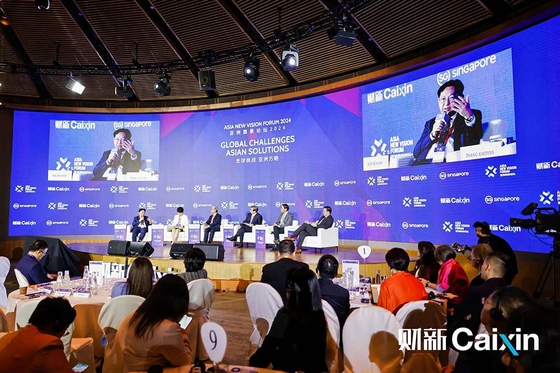Our Terms & Conditions | Our Privacy Policy
Asia New Vision Forum: Global Economists Blast Trade Protectionism
At the Asia New Vision Forum 2024 held in Singapore, leaders from various sectors convened to discuss a broad array of topics, including technology, investment, arts, and philanthropy [para. 1]. Key highlights from the forum on finance and the economy are summarized below [para. 2].
**On Trade Protectionism** [para. 3]
Trade protectionism poses a threat to emerging manufacturing sectors in ASEAN countries, according to Hoe Ee Khor, chief economist of the ASEAN+3 Macroeconomic Research Office. Khor emphasized that ASEAN countries started at the lower end of the supply chain, producing inexpensive products. Over time, they climbed up the value chain, becoming middle-income economies. However, the current backlash against globalization threatens this critical growth driver [4, 5]. Philipp Rösler, former vice chancellor of Germany, criticized protectionism. He argued that the loss of jobs in developed countries is due to a lack of technological advancement rather than free trade, which originally created those jobs [7, 8].
**On Tariff Disputes**
Bai Chongen, dean of the School of Economics and Management at Tsinghua University, proposed a new approach to address tariff disputes. He advocated for calculating industry-specific subsidies in each country and adjusting tariffs accordingly to level the playing field. Using the electric vehicle (EV) industry as an example, Bai suggested that if both the Chinese and Singaporean governments subsidized their EV industries, they could determine per-car subsidies in each country and impose tariffs to offset the differences, thereby ensuring fairer competition [11, 12, 13];
**On CBDC** [para. 14]
Andrew Sheng, a distinguished fellow at the Asia Global Institute of the University of Hong Kong, discussed the role of Central Bank Digital Currencies (CBDCs) in facilitating more direct financial interactions in global transactions. Sheng highlighted Project mBridge, a multiple-CBDC initiative involving China, Hong Kong, and Thailand. This platform uses blockchain technology to enable “local-to-local currency swaps,” reducing reliance on a third-party currency [16, 17, 18]. Sheng asserted that the future of global transactions would favor such local-to-local interactions due to the mutual trust between central banks [15, 19].
**On China’s Economic Recovery**
Fred Hu, chairman of Primavera Capital Group, identified consumer spending as a critical indicator of China’s economic recovery. Hu argued that the main challenge is the lack of consumer confidence, which is essential for driving household consumption. Given the global trade barriers, he emphasized that the spending power of the emerging middle class is pivotal for China’s economic growth [21, 22, 23]. Reviving consumer confidence would significantly improve China’s economic prospects [para. 24].
**On Chinese Companies’ Global Expansion** [para. 25]
Despite geopolitical tensions, particularly the rivalry between China and the U.S., Fred Hu expressed optimism about the global expansion of high-quality Chinese companies. He noted that while it’s more challenging for Chinese companies to succeed in the U.S. due to tariffs and political hostility, there are more welcoming regions such as Southeast Asia, parts of Europe, and South America [26, 27]. These areas are more receptive to Chinese investments and offer opportunities for global business growth [para. 28].
**On Growth Opportunities for Asian Countries** [para. 29]
Alicia García-Herrero, chief economist for Asia-Pacific at Natixis SA, discussed growth opportunities for Asian countries, driven by the diversification of global supply chains due to geopolitical factors. She noted that the U.S. Federal Reserve’s easing cycle could also benefit Asian economies [30, 31]. García-Herrero highlighted that recent Chinese stimulus measures could be a significant factor, though the extent of their impact depends on their scale. She also pointed out that while innovation is costly, Southeast Asian countries might have to invest more in advanced technology to stay competitive [32, 33, 34].
For more highlights from the Asia New Vision Forum, visit the dedicated topic page [para. 35]. Contact reporters Zhang Yukun at yukunzhang@caixin.com and Qing Na at qingna@caixin.com for further information [para. 36].
AI generated, for reference only
Images are for reference only.Images and contents gathered automatic from google or 3rd party sources.All rights on the images and contents are with their legal original owners.



Comments are closed.